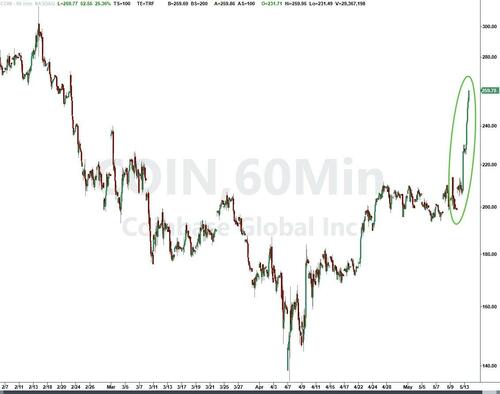


On May 19, 2025, Coinbase will officially join the S&P 500 - widely regarded as the most trusted, most tracked equity index in the world. With over $5 trillion in assets benchmarked to it, the S&P 500 isn’t just a measure of corporate strength - it’s a gravitational center of global capital allocation.
And starting next week, it will include a Bitcoin treasury company.
Coinbase currently holds 9,267 BTC on its balance sheet, valued at $963.8 million at today’s price of $104,000 per Bitcoin, making it the 9th largest public corporate Bitcoin holder globally.
As Nick Ward reports for BitcoinMagazine.com, this marks a quiet turning point for Bitcoin in capital markets - one that reframes the treasury conversation and reshapes how companies think about index eligibility, institutional flows, and balance sheet strategy.
Coinbase’s addition to the index means something profound: millions of investors will soon have indirect exposure to Bitcoin—and they didn’t choose it.
Because the S&P 500 is tracked by passive strategies, funds and institutions must purchase Coinbase stock in proportion to its index weight. If Coinbase is assigned even a 0.20% weighting, that implies more than $10 billion in net inflows from index-tracking vehicles.
This is not speculative capital. This is mandatory exposure—capital governed by rules, not conviction.
And for the first time, those rules lead directly to Bitcoin.
For years, Bitcoin on the corporate balance sheet was treated as a novelty—or worse, a liability. But Coinbase’s inclusion signals something different: Bitcoin exposure is now compatible with the highest standards of institutional eligibility.
It’s a powerful validation for public companies already holding Bitcoin—and a strategic consideration for those that aren’t. Index inclusion is not reserved for fiat-only treasuries. Coinbase’s addition confirms that sound operations and a Bitcoin-aligned balance sheet are not mutually exclusive.
In fact, they may now be complementary.
Coinbase may be the first S&P 500 company with a Bitcoin treasury—but it likely won’t be the last.
Strategy ($MSTR), formerly MicroStrategy, is widely viewed as the next potential candidate. The company meets many of the S&P 500’s baseline criteria:
And perhaps most notably: Strategy is the largest corporate Bitcoin holder in the world—by far.
As of today, it holds 568,840 BTC, currently worth $59.16 billion.
Its balance sheet is no longer just Bitcoin-heavy - it is Bitcoin-native. If admitted, Strategy would represent an even deeper exposure to Bitcoin inside the world’s most influential index.
This matters. Because it signals that Bitcoin is becoming a foundational component of corporate capital formation—not an outlier.
Coinbase’s entry - and Strategy’s potential follow-on - reinforces an emerging thesis: a Bitcoin treasury can enhance a company’s capital profile—not detract from it.
Here’s why:
In this context, treasury strategy becomes a capital markets strategy. Holding Bitcoin isn’t just about hedging inflation or diversifying reserves—it’s about aligning your company with where capital is flowing.
From a Bitcoin For Corporations standpoint, this is not just news—it’s a case study in what institutional acceptance looks like.
Coinbase has:
And Strategy, with its commanding treasury and growing influence, may soon follow—cementing Bitcoin’s place at the core of U.S. corporate indices.
This should embolden public companies and pre-IPO candidates alike. It’s proof that Bitcoin alignment doesn’t isolate you from the traditional system—it can embed you deeper into it.
This is the BFC thesis in action: Bitcoin-native capital structures are compatible with institutional legitimacy.
With Coinbase’s S&P 500 inclusion and Strategy potentially next, the implications are clear:
For CFOs and capital allocators, the takeaway is simple: Bitcoin on the balance sheet is no longer a bet - it’s a bridge. To the index. To the allocators. To the long game.
With Coinbase joining the S&P 500, Bitcoin exposure is entering the core of institutional portfolios—not through a financial product, but via a public company’s balance sheet. As Strategy positions to follow, this marks a broader shift: Bitcoin treasury strategy is becoming part of the mainstream capital structure.

